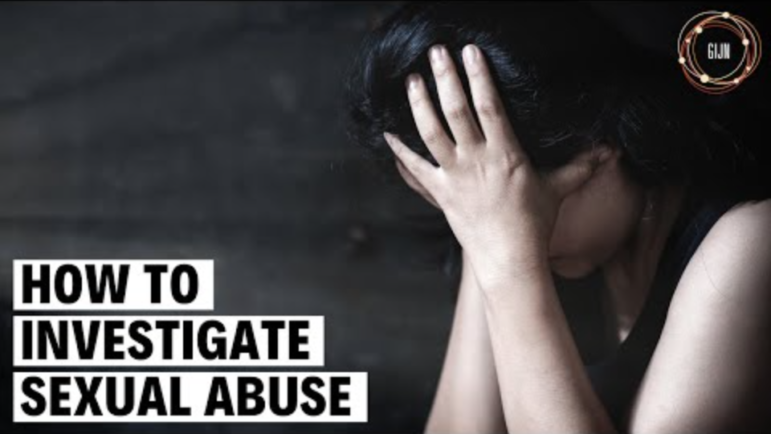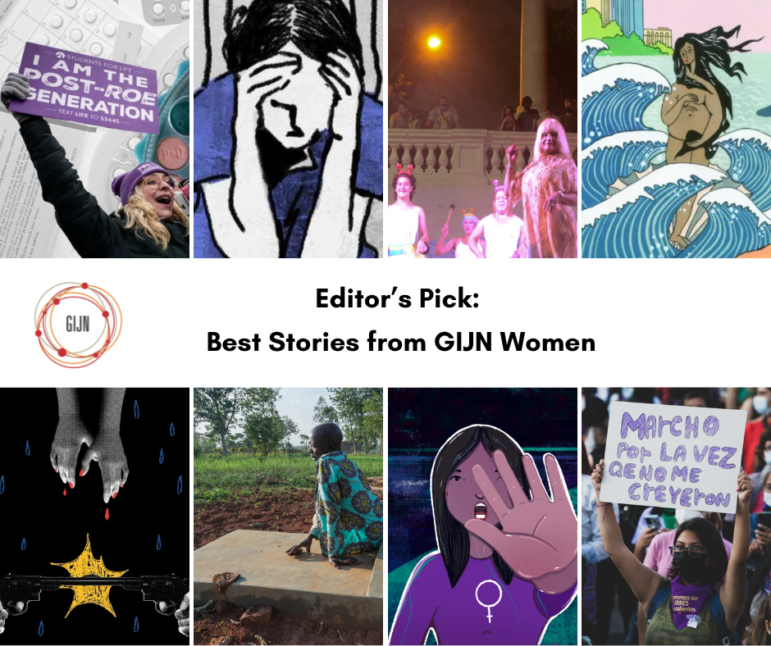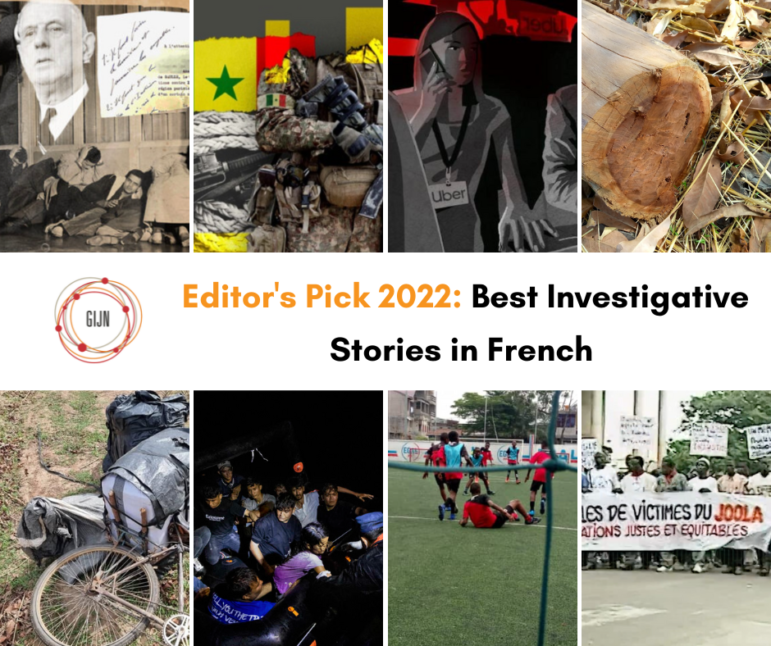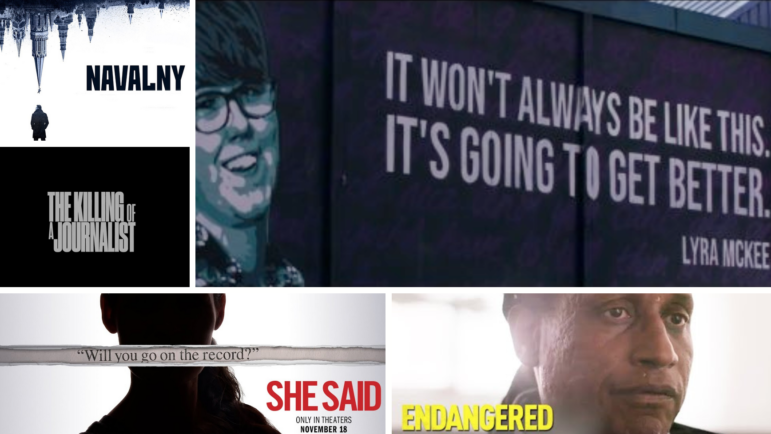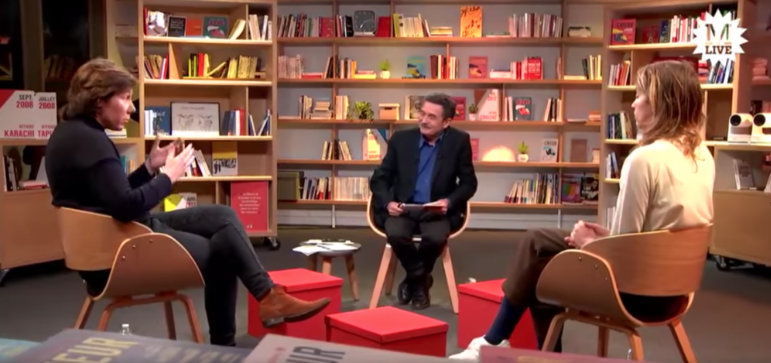

November 2019 Mediapart live on xx From left to right : Marine Turchi, Mediapart founder and director Edwy Plenel and french actress Adèle Haenel.
The French Journalists Behind Trail-Blazing Investigations into Sexual Violence
Read this article in

On the set of Mediapart Live in November 2019, where French actress Adèle Haenel (right) talks with journalist Marine Turchi (left) and Mediapart founder Edwy Plenel about its expose about the alleged abuse of Haenel by director Christophe Ruggia. Photo: Mediapart
In France, the jury of public opinion is still out when it comes to issues around sexual consent. When French politician Dominique Strauss Kahn, then managing director of the International Monetary Fund, was accused of the attempted rape of a hotel cleaner in 2011, a famous French journalist excused the allegations as “troussage de domestique” (literally, to strip or force sex on your servant). Meanwhile, as the #MeToo movement was gaining traction around the world in 2018, French actress Catherine Deneuve condemned the #MeToo movement, defending the right of men “to bother” women as well as the right for women not to “feel forever traumatized by a man who rubs himself against her in the subway.” And just last week, several actors walked out of the Césars, France’s equivalent of the Academy Awards, in protest after it was announced that Roman Polanski won awards for a recent film despite his history of sexual assault.
But, for nearly a decade, the French investigative website Mediapart has made sexual violence a front-page issue through its exposés. Founded in 2008 by several journalists who had worked at Le Monde, Mediapart audaciously bet on investigative journalism and financial independence, adopting a paywall and subscription model. With no public advertising or public subsidies, it grew into one of the main players in the French media world, with its investigations prompting the resignation of two ministers and several other political figures.
At the same time, Mediapart has also helped give a voice to silenced victims of sexual violence.
A year and a half before US media reported on sexual assault allegations against Hollywood producer Harvey Weinstein, propelling the #MeToo movement, Mediapart political correspondent Lénaïg Bredoux published a story which shook up the French political and media world.
Bredoux, who has worked at Mediapart since 2010, spent several months investigating allegations that deputy parliamentary speaker Denis Baupin had sexually harassed colleagues. Hours after publication, Baupin resigned. In 2019, he lost a high-profile defamation case against the journalists and his accusers, in which the judge praised the seriousness of the journalist’s work.

Investigative reporter Lénaïg Bredoux has worked at Mediapart since 2010. Photo: “Depuis Mediapart” documentary screenshot.
In November 2019, Mediapart published another major exposé on sexual assault when it reported the alleged abuse of French actress Adèle Haenel by director Christophe Ruggia when she was a young teenager. Marine Turchi, who joined Mediapart’s investigative team in 2017 after covering right-wing and far-right movements for the site for nearly a decade, spent seven months methodically and systematically verifying the actress’ account. The story resulted in the director being charged with sexual assault of a minor.
Public-interest reporting on sexual violence often gets conflated with sensational reporting on people’s private sex lives. Mediapart is absolutely clear on the difference. In February, the news site revealed it had been approached to exclusively publish sexual videos made by a Paris mayoral candidate, which were later leaked and caused a major scandal. Mediapart had refused to publish them, arguing that the content of the videos fell under the principle of respect for private life and had “absolutely nothing to do with the stories Mediapart had been publishing for nearly 10 years on sexist and sexual violence or on inappropriate behavior of people in positions of power.”
We tend to picture investigative journalists focusing on financial or political issues, but Mediapart has helped legitimize sexual violence as a valid investigative topic in France. GIJN’s French editor Marthe Rubió spoke to Bredoux and Turchi about the methodologies and motivations behind Mediapart investigations into sexual violence.
GIJN: Lénaïg, your first story on sexual violence was published 10 years ago. How did you start to take an interest in this topic?
Lénaïg Bredoux: I started working at Mediapart in 2010 and wrote my first story on sexual violence a few months later. At the time, I was a political reporter covering a case about the French Socialist Party. It was a personal choice to include sexual violence in my political coverage from the beginning. Of course, it was a personal choice which also received support and a strong collective incentive from the newsroom and its directors. It is very important to receive collective support because when you work on a topic for several months, it involves a team and support from your workmates. Fortunately, it’s not solitary work.
GIJN: Ten years later, you cover sexual violence in many fields: municipalities, political parties, elite universities, hospitals. Is it important for you to not only focus your coverage on famous figures?
Lénaïg Bredoux: Yes, I think it is really important that we don’t only investigate celebrities and publish stories that will create a big buzz. It is important to investigate professional environments as well. For example, I worked for six months on a 10,000-word story about a French university. An amendment was added to the law after the publication of my story. We have to investigate all fields and social backgrounds. Sexual violence is a social issue, not a minor news item. This is not something that only happens to stars and actresses. It is something which affects us all.
GIJN: Why did we have to wait so long for some journalists to start investigating these topics?
Lénaïg Bredoux: Classic investigative teams didn’t grapple with this — or take it seriously either. For a long time, sexual violence wasn’t seen as a legitimate or worthy topic. Investigative journalism is still a very masculine world. This is not a field of journalism which is likely to think about working on these kinds of topics.

Marine Turchi covered far-right movements for nearly a decade before joining Mediapart’s investigative team. Photo: Mediapart
Marine Turchi: For a long time — and even still today — sexual violence, femicide, and pedo-criminality [the crime of child sexual abuse] were issues covered by newspapers in the “miscellaneous news” sections, without investigating the context of these cases or the systems of complicity which shroud them in silence. One consequence is our difficulty naming these cases: for a long time in the news we would read pedophilia instead of pedo-criminality, “crime of passion” instead of femicide. In newsrooms, journalists who wanted to cover these topics have long been told that these were private issues, treated as “panty stories” or about people’s sex lives. They were taken lightly as subjects. But at Mediapart, we became aware quite early on that these cases were in the public interest and that we had to investigate.
GIJN: Do investigations into sexual violence require a specific methodology?
Marine Turchi: Our raw material is human material and not documents. We are talking to people who have been shaken to their core, so there is obviously a specific way to gather witness testimonies. But my opinion is that we should investigate sexual violence just as we investigate other topics, with the same system of checks. I don’t only cover cases of sexual violence; I also cover political and financial cases, and I think it is crucial that we don’t cover sexual violence in a separate bubble. Contrary to what we often hear, these cases don’t come down to one person’s word against another’s. We never publish a testimony alone: we look for other victims, witnesses, context, facts; we verify places, dates, earlier protagonists; we cross-check, we find documents. That’s why I worked on Luc Besson case for nearly a year and on the Adèle Haenel case for seven months.
Lénaïg Bredoux: We just have to refer to the 1881 law [France’s press freedom law]. We look for sources, we check, we question. We corroborate facts exactly as we would if we were investigating the Swiss account of Jérôme Cahuzac [Editor’s note: Mediapart revealed in 2012 that Cahuzac, a junior minister in the ministry of economy, had a bank account in Switzerland, which led to his resignation]. We are responsible for what we write before the courts, and that’s totally normal!
It is also essential to practice a type of journalism that takes risks, a journalism that takes the initiative and launches investigations even when there are no court proceedings. Not all newspapers practice this kind of journalism. Today, there are still newspapers that only write stories about sexual violence if there is already a legal complaint and court proceedings. If we take the Adèle Haenel case, for example, I don’t know which other newspaper would have let a journalist investigate the case for months, even though there were no legal proceedings.
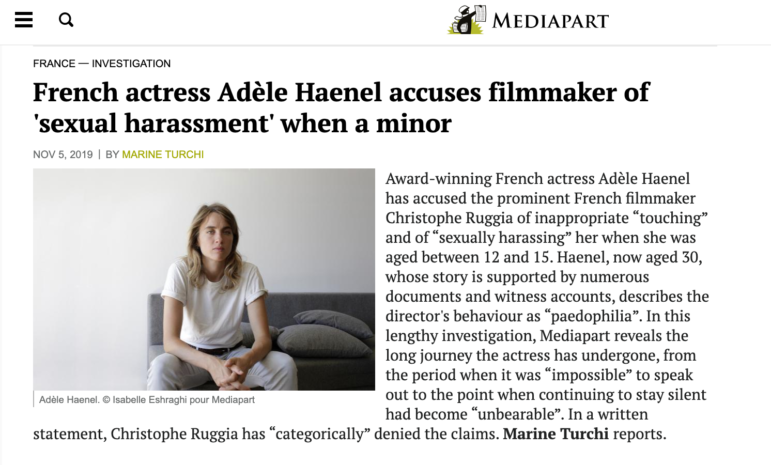
Screenshot of Mediapart’s 2019 investigation into alleged sexual harassment of French actress Adèle Haenel.
GIJN: Witnesses play an essential part in your stories. For the Adèle Haenel investigation, you said you interviewed more than 30 witnesses. Marine, even though you usually work on political and financial cases, you said you’d never found it so hard to get people to talk to you?
Marine Turchi: Yes, witnesses are often the hardest to convince to talk. Some think that it’s shameful to give testimony in sexual violence cases and don’t want to see their name linked to these stories. Others have seen or heard certain things but didn’t identify them as a problem, or they think they are private issues and don’t want to get mixed up in them. Why can’t they see themselves as whistleblowers on sexual violence stories, when people do see themselves as whistleblowers on corruption cases?
During my investigation into Adèle Haenel’s story, many witnesses were very reluctant to speak using their real names at the beginning. In that case, I first tried to understand why. Their arguments deflated very quickly. The challenge is to make them understand that they have a huge role to play in these cases. Without witnesses, investigative stories can’t exist. In this case, the witnesses’ statements showed that some people were already asking themselves about the director’s attitude to Adèle Haenel during the shooting of the film. Others — among them journalists — asked themselves why Adèle Haenel didn’t want to talk about this movie in interviews, or why others had described the shooting as a traumatic experience. But nobody went further.
GIJN: In the methodology you published alongside your story on Adèle Haenel, you say that you sent nearly all the witnesses their statements so they could read them over before the publication. Is that a method you use often?
Marine Turchi: Yes, more and more I offer the people I have interviewed the chance to reread their statements, on two conditions: I will mention this in the story, and I don’t accept censorship on important matters of substance. Globally, there is a loss of trust in journalists. There are so many people who tell me: “I was interviewed once by a newspaper, but they kept only one sentence, without any context, which didn’t reflect what I had said at all.” I cannot blame them, because due to lack of time and space many journalists today are forced to cut and significantly shorten quotes, which removes the original nuances. As a consequence, people become suspicious and increasingly reluctant to talk. For me, one way to show them that I am serious and they can trust me is to offer them the opportunity to reread their quotes. So I allow witnesses to talk for a long time — for two, three, or five hours sometimes — and after that they can read the quotes I am going to use. Of course, the idea is not to let them change everything they said. So if they request significant substantive changes, I refuse.
The second reason I offer witnesses the chance to reread their quotes is that sexual violence investigations rely a lot on testimony. You have to weigh every word and show that the witnesses didn’t speak without thinking. I offer this to witnesses from both sides. For example, there was a witness who said the word “toxic” five times during our interview, and we had a big discussion about this word. Another witness said “under the influence,” but told me after that he had been thinking about it and he would rather use different words. Then, we negotiate. My purpose is for witnesses to view their words as reflective of themselves, but at the same time I don’t want them to retract their statements. This is the whole challenge. I think we should offer more witnesses the chance to read their quotes so that they will confide in us. However, it is essential that we mention that we have done so in the story.
GIJN: Another specific feature of stories about sexual violence is that you are sometimes talking to people who have experienced very deep trauma. What is your relationship to the victims?
Lénaïg Bredoux: We have to keep a certain distance, but our sources give us a part of themselves so we have a responsibility over the way we use their testimony and the impact our story will have on their lives. This is never insignificant; it is always a very heavy impact. In a certain way, we have to care for them. Most of the time, there weren’t any legal proceedings before they spoke to us. Very few victims file complaints, so they are often really alone with their story. Most of the time, they are not supported by lawyers and or NGOs. I often give NGOs’ phone numbers to victims. However, I never encourage them to file complaints. That is not my job. We are not agents of the law. We are journalists. That is already enough. Our job is to say what a story reveals; it is not to say what people should do or not do.
GIJN: At Mediapart, most of the investigations into sexual violence are reported by women. Do you think it is more difficult for men to investigate these topics?
Marine Turchi: Men can absolutely work on these investigations. At Mediapart, many men are receptive to these topics. The challenge is how to ask questions of victims and in what order — all questions can be asked but there is a way to do it. In the past, we have also asked female victims if they would feel uncomfortable confiding their story to a man. If so, we ask a female colleague to do the interview. But in fact, most victims don’t care. Above all, they want someone to listen to them and someone who won’t be too harsh in their questions. There is a time for listening and a time for fact-checking. We come back to victims for a second time to ask them precise questions or to sort out contradictions, for example. And of course, we should always remember that men can also be victims.
GIJN: Mediapart’s newsroom has an equal number of men and women. Newsroom staff have also received training about sexual violence at work. Do you think this is essential to strong coverage of these cases?
Lénaïg Bredoux: It is quite easy to talk about these issues at Mediapart, where sexual violence is seen as a valid journalistic topic. But it hasn’t always been so easy and we’ve been learning as we grow, like everyone else. Don’t think we have a feminist paradise! Today, it is well-established in the newsroom that sexual violence is a journalistic subject in its own right and this is also related to the fact that there are an equal number of men and women in the newsroom and in management. But be careful — this is not enough. If you have an equal number of men and women but no journalistic conception of what makes a good investigative story on sexual violence, it won’t work. Both are crucial.
GIJN: At a time when trust in media is low and young people are turning away from traditional outlets, it is encouraging that journalism like the investigations into Harvey Weinstein can lead to a social movement like #MeToo, which had such a major impact on society. Do you feel that you’re making a change?
Lénaïg Bredoux: The Harvey Weinstein, Denis Baupin, and Adèle Haenel stories are three stories whose initiative was journalistic. By that I mean that the journalists started to investigate when there weren’t any legal proceedings yet. The impact of these stories show that the media can still be useful. Journalists can still help society with their tools, their skills, by being respectful to people, and being serious and forthright, without practicing opinion journalism or publishing raw testimony without corroborating it. They can help by cross-checking and investigating. The media showed they could prompt a public debate, a societal debate. What more can you ask for as a journalist? Let’s do this work!
 Marthe Rubió is GIJN’s French editor. She worked as a data journalist at the newspaper La Nación in Argentina and as a freelancer for various media such as Slate, El Mundo, Libération, Le Figaro and Mediapart.
Marthe Rubió is GIJN’s French editor. She worked as a data journalist at the newspaper La Nación in Argentina and as a freelancer for various media such as Slate, El Mundo, Libération, Le Figaro and Mediapart.

